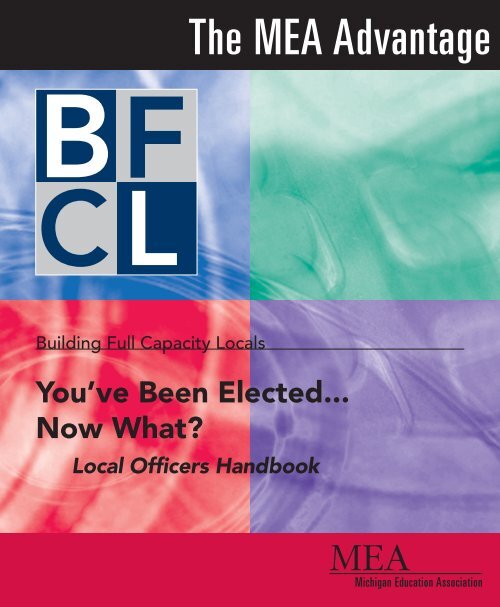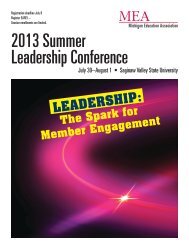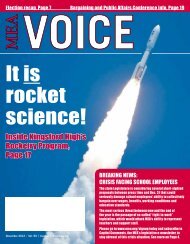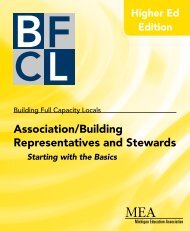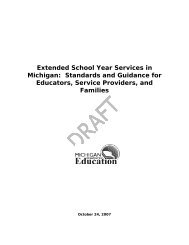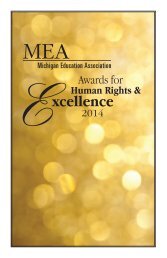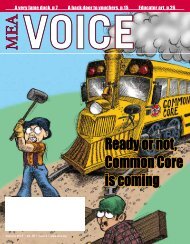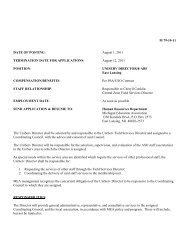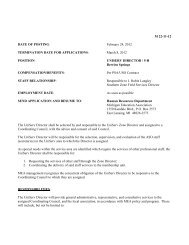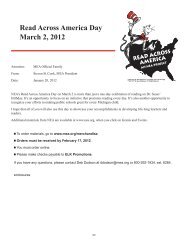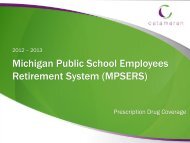You've Been Elected, Now What? - Michigan Education Association
You've Been Elected, Now What? - Michigan Education Association
You've Been Elected, Now What? - Michigan Education Association
Create successful ePaper yourself
Turn your PDF publications into a flip-book with our unique Google optimized e-Paper software.
Building Full Capacity Locals<br />
The MEA Advantage<br />
You’ve <strong>Been</strong> <strong>Elected</strong>...<br />
<strong>Now</strong> <strong>What</strong>?<br />
Local Officers Handbook
1<br />
Dear Local Leader,<br />
A full capacity local is one that is vibrant, relevant, strong and dedicated to member service.<br />
Critical to such a local is a knowledgeable, well-trained leadership team. In order to do the<br />
best job possible, each member of the leadership team needs to have a good understanding<br />
of what his/her job entails and the responsibilities that go along with it.<br />
The purpose of this booklet is to provide local officers with some basic information that can<br />
help them become more effective in carrying out their responsibilities. It’s a great starting<br />
point, but is not intended to be all-inclusive. It can serve to supplement materials that you<br />
may already have, including your local constitution and bylaws and other guidelines and<br />
past practices that may have been established in your local over the years.<br />
In addition to this booklet, there are a number of other MEA publications designed to<br />
help you strengthen your local and hone your leadership skills in a variety of areas. They<br />
are referenced throughout this booklet, and you can request copies along with other<br />
information, training and support by contacting Teri Battaglieri at tbattaglieri@mea.org or<br />
800-292-1934 or download at www.mea.org.<br />
This booklet is a compilation of materials resulting from the efforts and talents of many current and<br />
past MEA headquarters and field staff members and local leaders – too numerous to name, but not too<br />
numerous to thank.
A few words about elections (now that you’ve been elected)…<br />
It’s very important that you notify MEA about the results of your local elections.<br />
Local election results should be reported within 30 days of the date of the election. Forms for<br />
reporting election results are available on the Web at www.mymea.org in Departments, click<br />
on Executive Office/Governance. If you are a new president or have questions, call the MEA<br />
Finance/Membership Department at 800-292-1934.<br />
Report newly elected local officers on the Officer Election form, which should be filled<br />
out and sent to your local UniServ office for processing. The election results for MEA<br />
RA delegates and alternates should be reported on the MEA RA Delegate and MEA RA<br />
Alternate election forms. Complete these forms and send to the MEA Finance/Membership<br />
Department.<br />
Reporting local election results in a timely manner will ensure that RA delegates get all<br />
mailings and materials pertinent to the RA. Further, it will ensure that all officers receive<br />
information and materials that will help them do their jobs and keep members informed.<br />
“I start with the premise that the function of<br />
leadership is to produce more leaders, not<br />
more followers.”<br />
–Ralph Nader<br />
Elections<br />
2
President<br />
3<br />
The President<br />
The president is responsible for the smooth and efficient operation of the local association<br />
(union). A willingness to serve with a cooperative spirit is necessary in order to work effectively<br />
with co-workers and administrators. The president is the visible leader of the local and serves as a<br />
spokesperson with the school district, news media and other groups.<br />
The presidents’ primary responsibility is to oversee the operation of the local. The president must<br />
ensure that the functions of the local are being carried out by the appropriate committees and<br />
members.<br />
The president’s key source of support from MEA is the local UniServ director. In addition to<br />
bargaining and grievance help, your UniServ director provides day-to-day support on all the<br />
issues you face as a local president. They provide membership trainings, guidance on legal issues<br />
and serve as your clearing house to all the services provided by staff at MEA headquarters. It is<br />
important that you work closely with your UniServ director and keep him/her informed as issues<br />
arise.<br />
The main function of the local association is to represent its members in such things as:<br />
• Bargaining and maintaining the contract<br />
• Processing grievances<br />
• Managing local dues dollars<br />
• Making local decisions<br />
Each of the above functions is carried out by the officers and/or committees. The president must<br />
therefore ensure that:<br />
• Committees and officers exist to take care of the above local functions<br />
• Committees and officers are doing their jobs effectively<br />
“The leader is a teacher who succeeds<br />
without taking credit. And, because credit<br />
is not taken, credit is received.”<br />
–Lao Tzu
President’s To-Do Checklist<br />
•<br />
Register for a free mymea.org e-mail account at www.mymea.org.<br />
• Make sure that your UniServ office, MEA and NEA are notified in writing of your election.<br />
(Refer to page 2.)<br />
• Talk to your predecessor. Get copies of any minutes, correspondence and other significant<br />
papers pertaining to your position. Especially look over reports and actions of the last year so<br />
that the program is continuous and there are no loose ends.<br />
• Call on your superintendent, board president and news media to introduce yourself and to seek<br />
their cooperation in improving the educational program and staff morale.<br />
• Check on significant dates ahead – such as MEA and NEA Representative Assemblies, region<br />
and coordinating council meetings, leader trainings and school board meetings. Make plans to<br />
attend.<br />
• Make a list of key association officers, committee chairpersons, building representatives/<br />
stewards, school board members, superintendent, and key community contact people. Include<br />
phone numbers, e-mail addresses, etc.<br />
• Meet with your executive committee or board of directors and check to make sure that<br />
committees are organized and continue operating.<br />
•<br />
Establish all necessary task forces and committees.<br />
• Establish a list of people interested in participating in local association activities. Keep a “talent<br />
file” of these people and call upon them as needed.<br />
• Hold a preliminary meeting of the board of directors for the purpose of planning and setting<br />
goals for the year.<br />
•<br />
Set a monthly meeting schedule for the board of directors and executive committee.<br />
• Prepare an agenda in advance for each board of directors and executive committee meeting,<br />
and send it out in advance of each meeting.<br />
• Check with the local secretary before each meeting to make sure that all necessary committee<br />
reports, materials, minutes, correspondence, etc., are on hand.<br />
• Require your treasurer to produce and present a monthly financial report for the board of<br />
directors and the executive committee.<br />
4
5<br />
• Require each committee chairperson to present a monthly report to the board of directors or<br />
executive committee and a quarterly report to the general membership.<br />
• Work on achieving the goals you set for the year. Keep the membership informed of what they<br />
are and the progress that is being made.<br />
• Familiarize yourself with and follow accepted rules of parliamentary procedure in conducting<br />
meetings. (See pages 13-15.)<br />
•<br />
Obtain a copy of your district’s employee directory (if there is one).<br />
• Elect delegates to the coordinating council and region council. Make sure they attend meetings<br />
and report back to the executive committee and board of directors.<br />
•<br />
•<br />
•<br />
•<br />
•<br />
Make sure that your treasurer understands the dues transmittal obligations.<br />
Make sure membership materials are distributed.<br />
Update bank account signature cards.<br />
Familiarize yourself with your local’s constitution and bylaws.<br />
Communicate regularly with the other officers, especially the vice president.<br />
• Establish and maintain contacts with other local association presidents and attend meetings of<br />
local presidents including the statewide Presidents Caucus. Contact the MEA Executive Office to<br />
get contact information for this caucus.<br />
•<br />
Develop a quality working relationship with your UniServ director.<br />
• Update and submit your local governance documents for review by MEA’s Governance Review<br />
Committee if this has not been done in the past five years.<br />
• Learn about the trainings, materials and publications MEA has for local presidents by going to<br />
www.mea.org under Leaders, Building Full Capacity Locals.<br />
“Tough times will not last forever;<br />
only tough leaders do.”<br />
–Alberto Ortiz
The Vice President<br />
In many local constitutions, the job of the vice president is not clearly spelled out. Often, the job is<br />
defined as one that involves performing duties “as assigned by the president.” In order to have a<br />
team of officers that functions at the highest level, it is suggested that you take the time to identify<br />
the expectations and job responsibilities of the vice president.<br />
In general, it should be the responsibility of the vice president to:<br />
Serve as the “assistant president” helping and supporting the president in all of his/her duties.<br />
Be prepared to preside over meetings in the president’s absence.<br />
Be ready to assume the role of president.<br />
Serve as a trustworthy, confidential “sounding board” for the president.<br />
Serve as a co-signer on association bank accounts as authorized.<br />
Know the contract.<br />
Encourage members to get involved in the association.<br />
Pick up criticisms and “gripes” that are bothering members; lend a sympathetic ear.<br />
Be familiar with the local and MEA constitution and bylaws.<br />
Serve as chairperson, on occasion, of a program or other designated committee and know the<br />
functions of all committees.<br />
Other duties as assigned…<br />
In addition to the above, many local vice presidents assume other responsibilities as assigned by<br />
the president.<br />
The vice president may:<br />
•<br />
•<br />
•<br />
•<br />
•<br />
•<br />
•<br />
•<br />
•<br />
•<br />
Serve as the association’s grievance chairperson.<br />
Serve as the association’s crisis chairperson.<br />
Attend coordinating council or region meetings as a delegate or in place of the president.<br />
Represent the association at school board meetings.<br />
Serve as the association’s membership chairperson.<br />
Serve as the elections chairperson.<br />
Head up a special task force to resolve specific long-term member concerns such as<br />
building-quality issues or work safety issues.<br />
Serve with or in place of the president on district committees such as restructuring and<br />
long-range planning.<br />
Take charge of induction/mentoring of new association members.<br />
Oversee all local association committees.<br />
Vice President<br />
6
Secretary<br />
7<br />
The Secretary<br />
The secretary is the keeper of all records, minutes and correspondence of the union. A wellorganized<br />
secretary will be of great assistance to the other officers, the board of directors and the<br />
committees of the union.<br />
It is the responsibility of the secretary to:<br />
Take the minutes at all meetings of the association. The minutes should be an accurate<br />
interpretation of what goes on in these meetings.<br />
Make the minutes the permanent record of association business and activities and keep a<br />
permanent record of all minutes.<br />
Keep a systematic method of filing all correspondence, association records, treasurer’s reports,<br />
membership roster, up-to-date copies of constitution and bylaws, a list of all committee members<br />
and their contact information and copies of committee and miscellaneous reports.<br />
Send out notices of regular and special meetings of the association. Notify the UniServ office of<br />
meetings.<br />
Carry on the correspondence of the association.<br />
Work to encourage members to become more active in the association and encourage new<br />
leadership.<br />
Meetings<br />
1. Before the meeting:<br />
The president and the executive board generally develop the meeting agenda, though<br />
suggestions may also come from members, committee chairs, etc. The agenda should be<br />
sent out by the secretary in advance of the meeting. A good idea is to send it out when<br />
you send out notice of the meeting. Further, you may want to send out copies of the<br />
minutes from the last meeting.<br />
Prior to the meeting, don’t forget to confirm the time, place and room arrangements<br />
including special equipment needed. Remind any special guests of the meeting and<br />
provide directions, etc.<br />
You should have paper, pens, laptop and other materials. You should also have a roster of<br />
attendees. If your association uses a sign-in sheet to record attendance, it’s a good idea<br />
to have that prepared in advance of the meeting. You should also have multiple copies of<br />
the minutes as well as copies of other reports or information that will be covered at the<br />
meeting.
2. During the meeting<br />
The secretary’s job during the meeting is to keep an accurate, permanent record of<br />
what transpired during the course of the meeting (minutes). More on this below.<br />
3. After the meeting<br />
Send thank you notes to speakers, guests and others. Send reminders to members<br />
assigned special duties. Notify persons and committees affected by any actions taken<br />
at the meeting. File what needs to be filed and place dates decided upon in the<br />
calendar.<br />
The minutes<br />
The secretary’s most important responsibility is to keep an accurate permanent record of the<br />
minutes of meetings of the association and the executive board and/or board of directors.<br />
• The agenda will offer a guide for an outline of the minutes.<br />
Study the agenda and make a well-spaced skeleton of it. If you fill it in as the meeting<br />
progresses, the minutes will be very close to being completed by the time the meeting<br />
is over. List members, visitors, absent or excused members. State only motions that<br />
are made and seconded with the names of maker and seconder. List the items of<br />
unfinished business as well as important dates and facts to be remembered. Be sure to<br />
state the time of adjournment and always sign your name and the date.<br />
• Recording motions<br />
Be sure to include the name of the person making the motion as well as the name of<br />
the seconder. Record whether the motion was carried or defeated.<br />
• Recording the remarks of speakers and discussion<br />
Be brief, get main points and record differing points of view. Do not try to record<br />
every word. Report special instructions and procedures. Check with speakers to verify<br />
accuracy on topics that are controversial.<br />
• Pre-approval of the minutes and final copy<br />
Have the president read over the minutes and approve them before publishing the final<br />
version of the minutes. Be sure to duplicate them for the next meeting. You<br />
may want to publish abbreviated minutes – special e-mail or newsletter – for quick<br />
distribution to the entire membership.<br />
“If nobody quits until I do,<br />
there will be no quitting.”<br />
–John Lawson<br />
8
Treasurer<br />
9<br />
The Treasurer<br />
The buck stops here!<br />
The treasurer is essential to the efficient operation of the union. The treasurer is responsible for<br />
much more than keeping accurate financial records.<br />
The following are essential duties of the local treasurer:<br />
•<br />
•<br />
•<br />
•<br />
•<br />
•<br />
•<br />
•<br />
•<br />
Prepare the annual local budget proposal with the assistance of the president and budget<br />
committee (if applicable).<br />
Receive all revenues, including dues, and deposit all money in the bank.<br />
Transmit dues to MEA along with the necessary forms.<br />
Maintain an accurate accounting of all local funds. Keep a ledger showing all money<br />
received and all money spent.<br />
Pay all bills of the local.<br />
Sign checks for the local. All checks should be signed by two of the three authorized<br />
officers.<br />
Provide all necessary information and books to the annual audit committee.<br />
Report regularly to the board of directors and the membership concerning the income,<br />
expenditures and balance of local monies.<br />
Keep an up-to-date list of all members and nonmembers of the unit.<br />
“It is better to be a lion for a day<br />
than a sheep all your life.”<br />
–Elizabeth Kenan
Treasurer Do’s<br />
Do:<br />
•<br />
•<br />
•<br />
•<br />
•<br />
•<br />
•<br />
•<br />
•<br />
•<br />
•<br />
•<br />
•<br />
•<br />
•<br />
Refer to the MEA Local Treasurers Handbook. To obtain a copy, go to www.mea.org<br />
under Leaders, Financial and Membership Information.<br />
Make sure that the assets of the association are safeguarded and used solely for the<br />
benefit of members.<br />
Adopt a budget prior to the start of the fiscal year.<br />
Compare budget to actual expenses on a monthly basis.<br />
Identify and explain differences between budget and actual expenses and plan<br />
accordingly.<br />
Prepare and present complete and accurate financial statements to the board of<br />
directors on a monthly basis.<br />
Make timely deposits. Keep detailed records of all deposit transactions.<br />
Remit the MEA/NEA membership dues on time in accordance with the dues transmittal<br />
agreement.<br />
Have proper supporting written documentation (invoices, receipts, approved minutes,<br />
etc.) for every check written or wire transfer made. Make sure every disbursement is<br />
authorized.<br />
Require two signatures for every check written.<br />
Reconcile bank accounts monthly.<br />
Have an internal audit committee review the financial records on at least a yearly basis.<br />
Have an annual audit or review by a CPA if your internal policies require it.<br />
Comply with federal and state laws with respect to tax-exempt status. When in doubt,<br />
contact your accountant or the MEA secretary-treasurer, 800-292-1934. <strong>Association</strong> funds<br />
should only be used for the exempt purpose.<br />
File all federal and state reports on time including IRS for 990, 1099s, payroll tax reports,<br />
etc.<br />
Formally adopt and implement policies regarding conflicts of interest, code of ethics,<br />
document retention, travel reimbursement policies, check signing authority, financial<br />
reporting, and financial and operating standards.<br />
“The time is always right to do what is right.”<br />
–Martin Luther King<br />
10
11<br />
Treasurer Don’ts<br />
Don’t:<br />
•<br />
•<br />
•<br />
•<br />
•<br />
•<br />
•<br />
•<br />
•<br />
•<br />
•<br />
•<br />
•<br />
•<br />
Give out members’ personal information (Social Security number, home address, e-mail<br />
address, etc.).<br />
Spend MEA/NEA dues for local association activities. The local association is a trustee of<br />
these funds and is not entitled to use them.<br />
Conduct transactions for “private inurement” (for the benefit of an insider).<br />
Deposit association funds into personal bank accounts.<br />
Accept post-dated checks.<br />
Spend funds for activities not approved by the membership.<br />
Write checks for “cash.”<br />
Sign blank checks (missing payee or amount).<br />
Sign checks payable to yourself.<br />
Withdraw cash from the association’s bank accounts.<br />
Pay bills from statements. Require vendors to provide an original invoice. Be careful of<br />
copies and faxes to avoid duplicate payment.<br />
Use a bank or credit union that does not send the cancelled checks (or at least a copy)<br />
back to the association.<br />
Comingle PAC funds with the association’s general funds.<br />
Destroy association records until after the retention timeline has passed.<br />
“United we bargain, divided we beg.”<br />
“If they pay peanuts, they’ll get monkeys.”<br />
–Anonymous
The Committee Chairperson<br />
You can’t do it all alone!<br />
As a union officer, you will quickly realize that you cannot do all of the work by yourself. Forming<br />
some standing association committees led by committed volunteers will not only help you<br />
manage your work load, but will allow more members to become involved with their association.<br />
Standing committees that you may want to form include:<br />
•<br />
•<br />
•<br />
•<br />
•<br />
Communications/public relations<br />
Crisis<br />
Political action<br />
Grievance<br />
Elections<br />
The key to any successful committee is a dedicated, organized and enthusiastic committee<br />
chairperson who knows how to be a team player as well as a leader. Committees work better if<br />
they operate democratically, with democratic leadership and with members sharing in making and<br />
carrying out decisions. A good chairperson is one who:<br />
•<br />
•<br />
•<br />
•<br />
•<br />
•<br />
Encourages and embraces new ideas.<br />
Recognizes and utilizes the strengths of all committee members.<br />
Has a good sense of humor.<br />
Is committed to serving members through the work of the committee.<br />
Is comfortable and confident in a leadership role.<br />
Has a good understanding of the committee and its goals.<br />
There are many MEA publications, resources and trainings designed to provide committee<br />
chairpeople with the information and skills they need to successfully lead their committees and<br />
accomplish the goals of their committees. Find out more by going to www.mea.org, for Leaders,<br />
Building Full Capacity Locals (BFCL).<br />
“Be a light, not a judge; Be a model, not a critic.”<br />
–Stephen Covey<br />
Committee Chairperson<br />
12
Business Meeting<br />
13<br />
Conducting a Business Meeting<br />
Experienced local presidents say that the best run meetings are those that are well-planned<br />
in advance. You should develop an agenda and send it out ahead of time along with minutes<br />
from the last meeting and any other materials that might be helpful to have ahead of time.<br />
Good meetings start on time, end on time and do not get bogged down in the middle. Utilizing<br />
Robert’s Rules of Order will help to ensure that your meeting runs smoothly and that all have the<br />
opportunity to be heard.<br />
The basics<br />
• The president never takes sides but should act as a moderator seeing that all issues are fairly<br />
debated. Do not use the meeting as your personal “bully pulpit.”<br />
•<br />
•<br />
•<br />
•<br />
•<br />
•<br />
All members are equal: in rights, privileges and duties.<br />
Order must be preserved.<br />
Members must be courteous in their remarks and actions.<br />
Members are free to express their opinions, even if they are in a minority in their views.<br />
Business must be conducted efficiently and within a reasonable amount of time.<br />
Justice must be done to all by giving them an opportunity to speak and vote.<br />
• Give everyone wishing to speak the opportunity to do so before calling on the same person<br />
twice.<br />
• The president never makes a motion nor debates from the chair without first having<br />
appointed someone (the vice president) to preside over the meeting. The person appointed<br />
resides over the meeting until the vote has been announced.<br />
Parliamentary procedures for local presidents<br />
The following is a sample agenda you may want to use when you have association board<br />
meetings.<br />
I. Meeting called to order<br />
The president calls the meeting to order and makes the opening remarks.<br />
“The meeting will come to order.” (Opening remarks)<br />
II. Roll call, if necessary<br />
III. Approval of the minutes<br />
Send out advance copies of the minutes so that all have a chance to look them over prior to<br />
the meeting.<br />
Request any corrections to the minutes.<br />
“Are there any corrections to the minutes?”<br />
“If there are no (further) corrections, the minutes stand approved as read (as corrected).”
IV. Treasurer’s Report<br />
No motion is needed to receive the treasurer’s report unless the report is audited.<br />
“We will have (name) give the treasurer’s report.”<br />
“Are there any questions or observations? If not, the treasurer’s report will be received.”<br />
V. Reports of officers<br />
VI. Reports of committees<br />
Committee chairpersons who are to report should sit up front.<br />
No motion is needed for adoption of committee reports unless recommendations for<br />
association action are made. (See VII.)<br />
“We will have the report of the (name) committee given by (name).”<br />
“Are there any questions or discussion in regard to this committee’s report?” If not, the report to<br />
the committee stands.<br />
VII. Committee recommendations for action<br />
A motion to adopt is usually made by the committee chairperson and seconded by a<br />
committee member.<br />
“The (name) committee recommends that the association…”<br />
“Is there any discussion?”<br />
Each motion is discussed and disposed of before another main motion can be proposed.<br />
The same procedure can be followed for any motion that is made during the meeting.<br />
“Is there any new business?” *<br />
VIII. Unfinished business (old business)<br />
Unfinished business from the last meeting is brought to the floor for action.<br />
“Is there any unfinished business?” *<br />
IX. New business<br />
“Is there any new business?” *<br />
X. Other items for discussion or program (if any) *<br />
XI. Announcements<br />
“Are there any announcements?”<br />
XII. Adjournment<br />
The president automatically adjourns the<br />
meeting, except when there is unfinished<br />
business. Then a motion for adjournment<br />
must be made and voted on.<br />
“If there is no further business, the meeting<br />
will stand adjourned.” (Gavel tap.)<br />
*<br />
“Is there a motion?”<br />
“Is there a second?”<br />
“Is there any discussion on the motion?”<br />
“All those in favor of the motion say yes.”<br />
“All those opposed of the motion say no.”<br />
“Are there any abstentions?”<br />
“The motion passes/fails.”<br />
14
15<br />
Most Frequently Used Parliamentary Motions<br />
I. PRINCIPAL MOTION<br />
MOTIONS PURPOSE VOTE<br />
REQUIRED<br />
1. A main motion To introduce business YES YES YES MAJORITY YES NO<br />
II. SUBSIDIARY MOTION<br />
2. To postpone indefinitely To suppress action YES NO YES MAJORITY YES NO<br />
3. To amend or substitute To modify a motion YES YES YES MAJORITY YES NO<br />
4. To amend an amendment To modify a motion YES NO YES MAJORITY YES NO<br />
5. To refer to a committee To modify a motion YES YES YES MAJORITY YES<br />
6. To postpone to certain time To defer action YES YES YES MAJORITY YES NO<br />
7. To limit or extend limits of debate To modify freedom of debate YES YES NO TWO-THIRDS YES NO<br />
8. To call for the previous question To force into immediate vote YES NO NO TWO-THIRDS NO NO<br />
When in doubt about proper parliamentary procedure, use your<br />
common sense to clear up problems and continue business.<br />
NEED A SECOND<br />
AMENDABLE<br />
DEBATABLE<br />
SUBSIDIARY MOTIONS<br />
CAN BE APPLIED<br />
MAY INTERRUPT<br />
A SPEAKER
Tips on Dealing with Administrators/Supervisors<br />
As a union officer, you have an obligation to represent members at meetings with<br />
administrators (and others in supervisory roles) when requested to do so by a member. An<br />
administrator may also request your presence at a conference with a member. Whenever you<br />
meet with an administrator, as a member advocate you should always keep the following in<br />
mind:<br />
• Never humble yourself – you are an equal party.<br />
• Develop a strategy for every meeting.<br />
• Don’t be argumentative.<br />
• Don’t make deals immediately – always take time to think it over!<br />
• Keep notes of the meeting.<br />
“There is a time to be tough, a time to be<br />
adamant, a time to be open to compromise and a<br />
time to reach agreement.”<br />
–James Hoffa<br />
Tips<br />
16
Resources<br />
17<br />
Resources<br />
The MEA Web site (www.mea.org) contains a host of information and resources designed for<br />
local leaders. When you enter the site, click on For Leaders and you will find a variety of links<br />
to everything you need to help you strengthen your local and do your job more efficiently and<br />
effectively. In addition, for more in-depth information about leading your local, you may want<br />
to download and read MEA’s Leader Handbook, which is available at www.mymea.org, under<br />
Publications.<br />
If you are interested in learning more about MEA’s initiative designed to strengthen local<br />
associations and provide local leaders with the time, training and tools they need to do their jobs,<br />
click on www.mea.org, under For Leaders, Building Full Capacity Locals or contact Teri Battaglieri<br />
at tbattaglieri@mea.org or 800-292-1934.<br />
Important contact information:<br />
MEA Headquarters<br />
1216 Kendale Blvd.<br />
East Lansing, MI 48823<br />
800-292-1934 www.mea.org<br />
MESSA<br />
800-292-4910 www.messa.org<br />
MEA Financial Services<br />
800-292-1950 www.meafs.com<br />
“There is no greater calling than to serve your<br />
brother. And, no greater satisfaction than to<br />
have done it well.”<br />
–Walter Reuther
Important Contact Information<br />
President’s contact information:<br />
______________________________________________________________________________<br />
______________________________________________________________________________<br />
Vice President’s contact information:<br />
______________________________________________________________________________<br />
______________________________________________________________________________<br />
Secretary’s contact information:<br />
______________________________________________________________________________<br />
______________________________________________________________________________<br />
Treasurer’s contact information:<br />
______________________________________________________________________________<br />
______________________________________________________________________________<br />
UniServ director’s contact information:<br />
______________________________________________________________________________<br />
______________________________________________________________________________<br />
UniServ field assistant/office contact information:<br />
______________________________________________________________________________<br />
______________________________________________________________________________<br />
Coordinating council chairperson’s contact information:<br />
______________________________________________________________________________<br />
______________________________________________________________________________<br />
Contacts<br />
18
1216 Kendale Blvd., PO Box 2573 East Lansing, MI 48826-2573<br />
Iris K. Salters, President Steven B. Cook, Vice President<br />
Peggy McLellan, Secretary-Treasurer Lu Battaglieri, Executive Director<br />
The mission of the MEA is to ensure that the education of our students and<br />
the working environments of our members are of the highest quality.<br />
2009<br />
Building<br />
Full<br />
Capacity<br />
Locals


